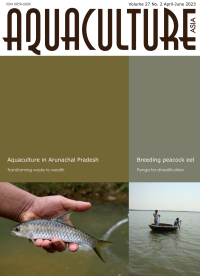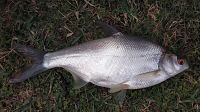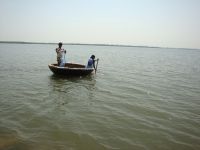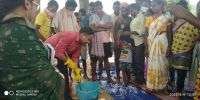In this issue:
Aquaculture and fisheries perspectives in Arunachal Pradesh; Present status of medium saline ‘bheri’ fishery and integrated mangrove-aquaculture in West Bengal, India: A short study: Part 2; Transforming waste to wealth: An onsite demonstration of transforming fish waste into fish fertiliser to tribal communities of Jharkhand; Innovative fish sale improved livelihoods at Jurala dam in Telangana, India; Pengba, Osteobrama belangeri – a candidate species for diversification in aquaculture; First report on successful captive breeding of peacock eel, Macrognathus aral; NACA Newsletter.
The peacock eel Macrognathus aral is a popular ornamental and food fish species found in the Eastern Ghat region of India and Pakistan, Sri Lanka, Bangladesh, Nepal and Myanmar. The species is classed as Low Risk near threatened in the CAMP report. Peacock eel inhabits shallow waters of plains, wetlands, canals, paddy fields, beels and slow-moving rivers with vegetation. Captive breeding is the only way to fulfil demand and protect wild stocks. This article documents the first successful reported captive breeding of M. aral, embryonic development and larval rearing.
Pengba (Osteobrama belangeri) is a near-threatened minor carp endemic to eastern Manipur in India, Yunnan and Myanmar. A migratory species, wild populations of pengba have declined due to the construction of dams and barranges, and possibly also due to the introduction of alien species. Pengba is highly preferred by consumers and attracts a high market price. This article describes the feeding habits and reproductive biology of pengba, and aquaculture techniques for seed production and grow out in monoculture or polyculture.
About 200 families that were displaced by construction of the Jurala reservoir have found new employment in fishing and value-added industry. Local people who up fishing add value to their catch by keeping it for live sale in locally-manufactured cages. Local people also use the live fish to prepare a variety of fresh fish dishes, servicing the tourist trade attracted to the reservoir. Over 400 people are now directly or indirectly self-employed through these practices. This article describes the new practices and the improved income that is being generated by fishers and local entrepreneurs.
Management of waste products produced by fish processing can be an environmental and public health issue. But fish waste can be converted into agricultural fertilisers using simple backyard technology. This article describes techniques for producing fertilisers from fish waste, and a successful demonstration of the technology by the College of Fisheries, Gumla, to tribal communities in the state of Jharkand, India.




